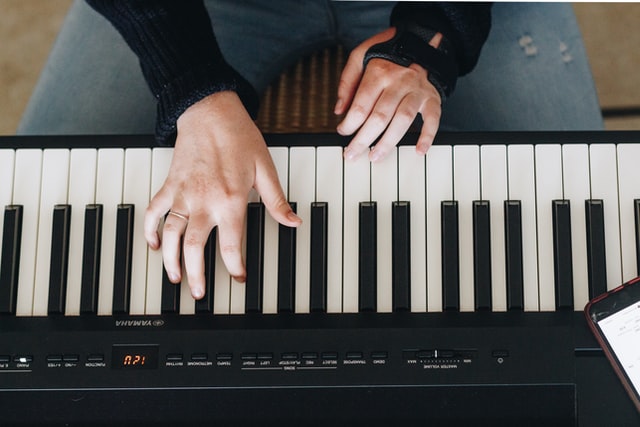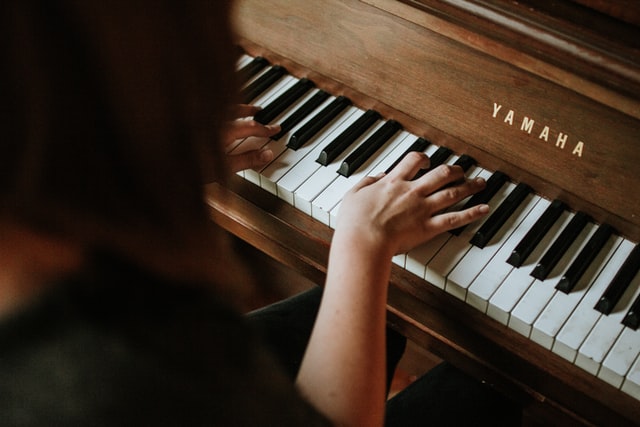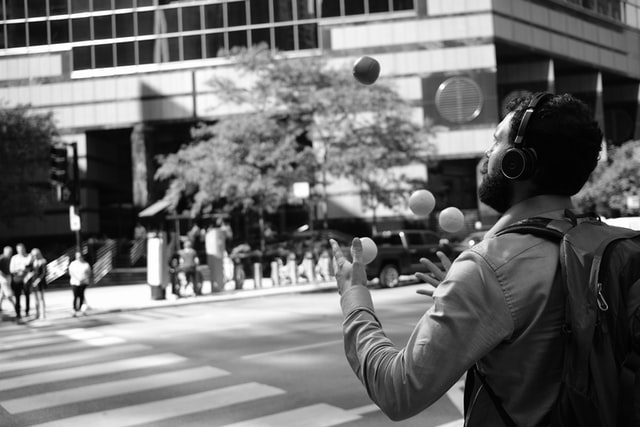Benefits of playing the piano are slightly different for everyone. In this guide, we’re looking at some of the main plus points for piano players. Why is it a good idea to learn how to play the piano? Should it be actively encouraged for people to take up this hobby or does it not really matter?
Though there are many different ways to improve your life, and piano is no miracle solution, there are some incredible benefits, spanning as far and wide as increased mental health and improved memory.
We will cover all of the details in our guide to the benefits of playing the piano, but we’re not the sort of site that says everyone has to play the piano for their own good! For some people it is a perfect solution, others just aren’t that interested. However, you can be sure that the piano has a huge number of positives for most who stick with it.
Benefits of Playing the Piano
Benefit #1 – Split Concentration and Multi-Tasking
You simply have to be able to do multiple things at once if you are going to be able to play the piano to any good standard. If you watch a really good piano player, they might be doing an incredible number of things at once.
Here is an example:
- Playing a melody with one hand.
- Playing chords or bass notes with the other hand.
- Reading music.
- Reading and singing lyrics.
- Using the pedals.
- Improvising.
As you will probably expect, you are not going to get the point where you can do all of this quickly. It takes many years for playing the piano to become something close to second nature. However, splitting your focus like this can improve skills for other parts of your life.
As well as being one of the benefits of playing the piano, it is a bit of a scary thing for beginners. If you have ever learned how to drive, you might remember how difficult it seemed at the start, but eventually, it becomes second nature. Remember this when you are learning how to play.
The main benefit of sticking with this is that it will help you to be able to multitask in other areas of your life, helping to develop your brain in a way that can be useful for lots of other things throughout your life. This guide lists job interviews and school work as some of the areas of life that can benefit from being able to do multiple things at once.
Benefit #2 – Brain Development and Intellect
There are a lot of different ways to develop your brain, so we’re not being elitist about the benefits of playing the piano. However, there have been numerous studies that indicate playing the piano can be brilliant for brain development in both children and adults.
Steinway, the globally renowned piano brand, has cited studies about the relationship between studying the piano and school grades for children. “Children who have had a few years of piano study under their belts can remember twenty percent more vocabulary words than their peers.”
A similar statement from the brand claims that “childhood musicians are better equipped later in life to retain information from speeches and lectures.”
There could be a debate about cause and effect. Are young people who play the piano just naturally smarter? But most people agree that the piano is a great way to boost intellect. This Forbes article from back in 2004 claims that people who play the piano increase in intelligence when measured against a number of different metrics.
Benefit #3 – It Can Open Doors Socially
This may not seem like one of the key benefits of playing the piano, especially when you consider all those hours that will be spent cooped up indoors learning scales and practicing, but once you reach a certain skill level, the piano can go from being a solo instrument to one you play with others.
There are opportunities to join bands, play in groups, join societies, or even teach others your newly found skill. The piano is a pretty good way to meet people and encourages getting out of the house to play at concerts, for example.
You don’t have to use the piano in this way, some people prefer to stay at home and master their art. There’s no denying that it can be a social instrument just like any other.
Benefit #4 – Improving Motor Skills in Children
In some scenarios, the benefits of playing the piano are different for children when compared to adults. They might find that there are specific benefits to their own skills and outlook that adults may not require. For instance, adults may have developed them in other ways.
Wikipedia describes a motor skill as “a learned ability to cause a predetermined movement outcome with maximum certainty”. Things like walking, coordination, speech, these are all examples of motor skills.
Skills involving communication, and certainly involving coordination, can be boosted by playing the piano.
This guide explains that “music lessons can help children fine-tune their motor skills, improving the use of hands, fingers, and other body areas to do routine and complex tasks”. It is basically a way for children to test their abilities and learn how to do new things.
Other great motor skill-building activities include sports and solving puzzles, but they don’t quite have the same level of creative thinking as the piano. We recommend introducing playing the piano as a way to build these skills. You can use a keyboard or a digital piano, there’s no need to spend thousands on a Steinway!
A fascinating Ohio university study can give you some further reading on this subject for those who are interested. It compared children who had gone through music lessons to those who hadn’t. The study, entitled “The Long-Term Effects of Childhood Music Instruction on Intelligence and General Cognitive Abilities” is available to read online. It concludes that music lessons helped with the children’s’ development.
Benefit #5 – Increase in Growth Hormones
This is one of the more stunning and fascinating benefits of playing the piano, but the science is undeniably there to back this up. There are a number of health benefits to playing the piano, and the increase in HGH or “Human Growth Hormones” has been observed in studies.
You might think that this is just a benefit for young, developing minds and bodies, but HGH can help people at any age. They reduce the aches and pains we feel as we get a little older, as well as helping to heal and rest.
The increase in HGH has been observed by the University of Miami. There was a group of people who were having keyboard lessons, and the HGH levels were compared to those who did not. The increase in HGH shows increased energy levels, a reduction in the spread of osteoporosis and even increased muscle mass!
We expect there to be a lot more studies in the future regarding the physical benefits of learning how to play the piano, but it is pretty certain that an increase in HGH is a fantastic thing for people of virtually any age.
Benefit #6 Learning Perseverance and “Life Lessons”
This is an extremely useful character-building exercise for children! Parents should encourage their kids to go through things that are challenging, but not disheartening, and that they can overcome.
It’s a psychological point, and one that is very important. The experiences we have as children, or even later in life, can shape the way we approach other aspects of our life, and one of the key benefits of playing the piano is the fact that it can introduce a determination, perseverance, and steeliness to young people.
Playing the piano is difficult. Lessons can be hard, and the setbacks and patience required can also be big challenges, especially for younger people. However, going through it usually makes them more rounded people in the long run. There are a number of ways to teach these skills, and piano is just one of them, but most would agree that they grew stronger overcoming the challenges.
We’re not saying that you should force young people to play the piano whether they want to or not, or that you can only become a well-rounded individual if you decide you are going to learn how to play the piano, but it can be a very useful tool for learning some life lessons. Things aren’t always easy, but often, it is worth sticking with them!
If you are going to become good at the piano, you will need to learn discipline along the way. This is a skill that can be applied in loads of other aspects of life, including career, to help you to go further in the future.
Benefit #7 – Neuroplasticity
We don’t want to get overly scientific in this post. You might just want to trust us that the science backs up the benefits of playing the piano! This is a really interesting benefit that has been backed up by studies, and shows a direct benefit to the brain.
Neuroplasticity is basically the brain’s ability to form synaptic connections as well as change them within the brain. Think of it as the way the brain can change its form and the way it operates to help with activities. Our brains are always evolving.
The benefits of playing the piano on the brain are fascinating. You could spend days reading the studies that are out there. We’ll try to sum up the findings of the impact of the piano, which seems to be unique in the way it changes the brain.
When you play the piano, read music and create new pieces of music, you’re making new connections in your brain’s neural network. This prepares your brain for other things in the future, such as academic pursuits that might need you to use similar parts of the brain.
Studies have shown that when you are practicing, and giving yourself new and challenging pieces to tackle, you’re also improving lots of other aspects of your life and the way you think. From spacial awareness to speech and language skills, to math and your memory, all can be improved indirectly by playing the piano.
It might help to think of the piano as a sort of gym for your brain. By flexing this brain “muscle” you are making it easier to take on other aspects of learning in the future. One of the key benefits of playing the piano has to be the way it impacts the brain.
Benefit #8 – Leaving a Legacy
A lot of people want to do so much more than just play an instrument, they want to become musicians!
What do you want to do with your life? What sort of legacy do you wish to leave behind? A lot of people enjoy the idea of a musical legacy. Performances that other people have enjoyed, recordings that have been made, and songs that have been written.
You can become a musician with the outlook of leaving a legacy behind. This can even include joining bands or teaching other people. You may dream of one day selling out huge concert halls with people flocking to see you!
This isn’t possible for everyone, and it is not even one of the key benefits of playing the piano for a lot of hobbyists, but for some people it is their whole motivation. What better gift to leave the world than your music?
Even if one day, it is a case of showing your children or grandchildren a grainy recording of you playing in a jazz club, it is a legacy nonetheless, and learning to play the piano can become a part of your identity.
Benefit #9 – Increasing Your Memory Capacity
This has been briefly covered in some of the other benefits, but not in detail. One of the key benefits of playing the piano is the fact that it can improve your memory in the long run.
When you learn how to play a song, you need to remember a lot of information. Rachmaninoff’s Piano Concerto No. 3 has thousands of notes within. This fascinating guide to how musicians remember a lot of the notes can help you to get some understanding of it.
Playing the piano stimulates different parts of your brain, including those used for remembering things. This means that piano players may perform better in certain areas of their life. For example, if you are a brilliant pianist, you might find it much easier to learn mathematical equations.
By repeatedly stimulating and testing the brain with piano performances and learning, we’re giving it the chance to form new connections and the brain becomes used to remembering more information. Having forgetful moments or struggling to retain new information can become a thing of the past.
Benefit #10 – Mental Health Benefits
As if there weren’t enough benefits of playing the piano already mentioned, we’re moving on to one of the very biggest.
Playing the piano can be a huge help to your mental health. Whether you are suffering from a condition or not, the piano can be a tool for improving your mood and helping you to feel calmer, more optimistic, and better about yourself.
The mental health benefits in children are very well explained in this post. It is clear that one of the key benefits for people of all ages is the reduction in stress. We’re not just talking about the fact that listening to piano can have a soothing impact, as learning and being able to play can soothe, too.
Being able to play the piano is a way to keep your brain busy and focussed on one constructive activity. This can allow you to switch off from many other problems in the world.
As well as being a distraction, playing the piano gives an outlet for expression. Many of the leading mental health professionals around the world agree that being able to express yourself creatively can have a positive impact on mood. It can be a way for people to process their feelings and to vent.
There’s lots of anecdotal evidence for the benefits of playing the piano stretching to mental health benefits, but you don’t just have to take someone’s word for it, as studies have been carried out, too.
The Vermont College of Medicine compared children with and without music training, and found that those playing the piano or other instruments were more developed emotionally. The outlet for expression is thought to be one of the driving forces behind this. Emotional intelligence has become simpler to measure and understand in recent years.
Another key benefit is the fact that people get a big boost out of the positive feeling of having learned a new skill. Most of us have experienced this in some way. If you’ve done something constructive, and left a night class with a new skill under your belt, you feel good about yourself. Solving mental health issues is not as simple as this, but it is a building block toward confidence.
A further study, this time by Michigan State University, backed up the findings of many other studies when it comes to learning an instrument, and recorded lower levels of depression and anxiety among young people who had taken up an instrument.
Another Reason to Learn How to Play the Piano
As well as discussing all of the benefits, there is another key reason why it is advised now, more than ever, to learn how to play the piano.
To go with all the benefits of playing the piano, we present the simple fact that the piano is more accessible than it ever has been. Gone are the days where you would have to sit through pricey lessons, with access to a hugely expensive piano. Using tools like the Pianu academy can allow you to start to learn using a MIDI-compatible keyboard or digital piano plugged into your laptop.
As well as this, there are more resources available online than ever before, to suit different ambitions, learning styles, and genres of piano. Technology has started to break down a lot of the barriers that we would have previously had when it came to learning how to play the piano.
Access to equipment has also become more straightforward. Electronics are cheaper, and there are some affordable keyboards and digital pianos, some of which we’ve recommended here on the Pianu blog. These guides can make it easier to get your hands on a suitable instrument and begin the learning process without having to spend a fortune. You can learn with a piano teacher if you want, but it isn’t essential. Learning piano online is achievable.
Summarizing the Benefits of Playing the Piano
Everyone’s experience with the piano is different. Though it can feel tough at times, in the long run, most people agree that it is a positive experience and a great way to spend your time. There are lots of different benefits and positives for both children who are still developing, and for adults. It’s never too late to get started on your piano journey.
Our list of 10 benefits of playing the piano has hopefully filled you with excitement to get started, but the truth is that there are a lot of other benefits, too. Some of them might be individual to your own needs. Perhaps you have always dreamt of playing a song for someone?
The benefits of playing the piano can be far-reaching, and though there are a lot of hurdles and frustrations along the way, the benefits in the end far outweigh all of these issues. If you’ve dreamt of being able to sit at a piano and play beautiful compositions, now is a time as good as any other.
You don’t have to become the next big thing in the world of classical music, or even pop music. You don’t have to reach the point where you can play massive concerts in order to experience a huge number of benefits of playing the piano.
Let your friends know about us.
Leave a Reply
You must be logged in to post a comment.















wonderful post!
Thank you!